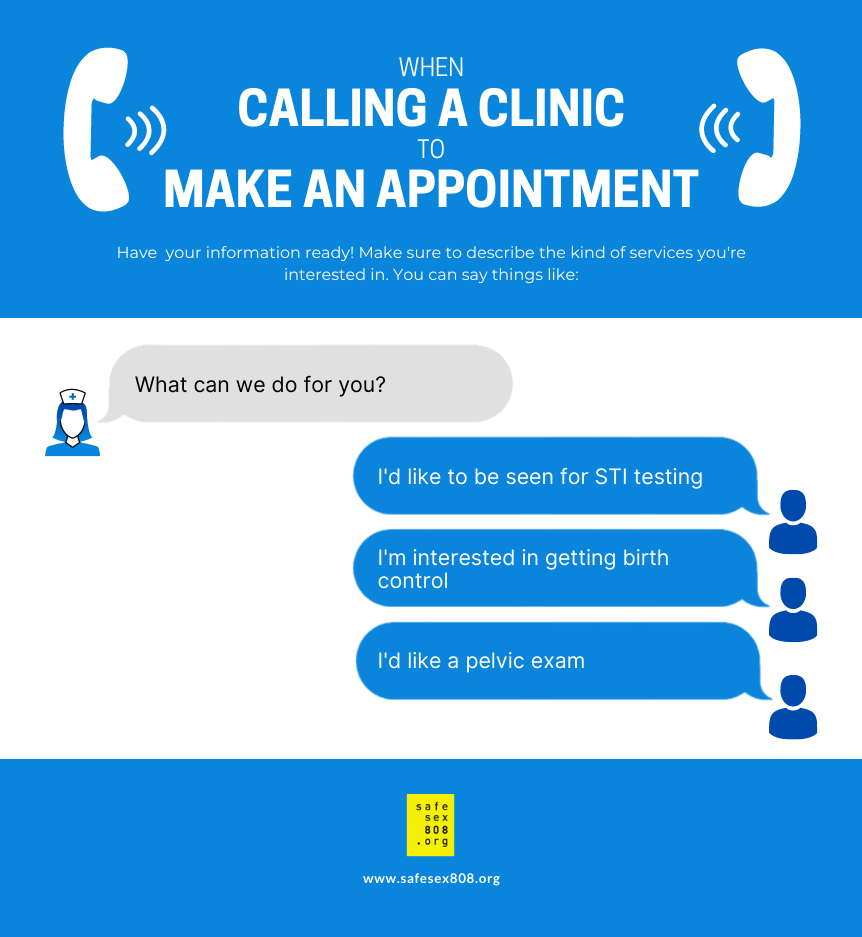Making and Preparing for an Appointment

Making an Appointment
TIP!
Write down the date and time of your appointment and create reminders for yourself. Depending on the clinic, you may be removed from the schedule if you’re late. Clinics can also run behind schedule, so be prepared for any delays.
The clinic may:
- Give you phone numbers for other offices if they don’t offer the services you need.
- Be able to give you an idea of how long your appointment will take.
- Ask for your insurance information.
- If possible, have your insurance card handy so you can answer any questions.
- If you don’t have insurance or don’t want to use your insurance for the visit, let the receptionist know so they can tell you approximately how much the visit will cost.
- For more tips on how to deal with insurance and paying for services, check out the Confidentiality page.
If you prefer to see only a male or female provider, you can make a request when making the appointment. Depending on the clinic, the staff may be able to accommodate your request.
If This is Your First Appointment
- Ask your family about their medical history. This helps your healthcare provider better understand your health to give you the best care. Some questions you can ask are:
- Has anyone in our family had cancer, diabetes, or a heart disease?
- Has anyone in our family died from cancer, a heart attack, or other diseases?
- Does our family have a history of stroke or high blood pressure?
- Do we have a history of alcohol or drug abuse?
- Does anyone in our family have a genetic disorder?
- If applicable: Try to remember the date of your last menstrual period
- Why is this important? Check out this page from Johns Hopkins.
- You can search for and install period tracker apps on your phone to make things easier. (Note: Period tracker apps aren’t always accurate, especially if you don’t have regular periods, but they are helpful.)
What to Bring
- Photo ID (driver’s license, state ID, passport, school ID, etc.)
- Insurance card
- Questions
- What are you curious about that you can ask your healthcare provider? There’s no reason to be ashamed, your provider is there to help you understand your body and address your concerns.
- Write them down on your phone or a piece of paper so you don’t forget!
- A trusted friend or family member (optional!)
- Whether it’s your first appointment or 50th, having a trusted friend or family member can help relieve any anxiety you may have.
At the Appointment
Every clinic operates differently. Some may have you see a nurse or counselor first; others may take you directly to the healthcare provider.
- When you arrive, check in at the front desk
- Tell the staff your name and appointment time
- Some clinics may ask you to fill out some paperwork (e.g., medical history, service agreement)
- If you have trouble filling them out, you can ask the staff or your provider for help.
- The staff may take your blood pressure, weight, and height measurements
- When you see your provider, they will ask you some questions and the reason for your appointment
- Be honest and feel free to ask the questions you’ve prepared in advance.
- Depending on the medical concerns that you have, your provider may need to examine you to get more information to help them to make a diagnosis. Sometimes this will include a pelvic exam or an examination of your genitals, but this is not always required.
- If your provider recommends doing an exam and you don’t feel comfortable, let them know. They may be able to help you with coping strategies or schedule you for another appointment to complete the exam at a time when you feel more comfortable.
- If you need medication: Know which pharmacy you’d like to visit beforehand
Content reviewed by Shandhini Raidoo, MD, MPH, FACOG
Last Updated: October 10, 2020 by Phyllis Raquinio